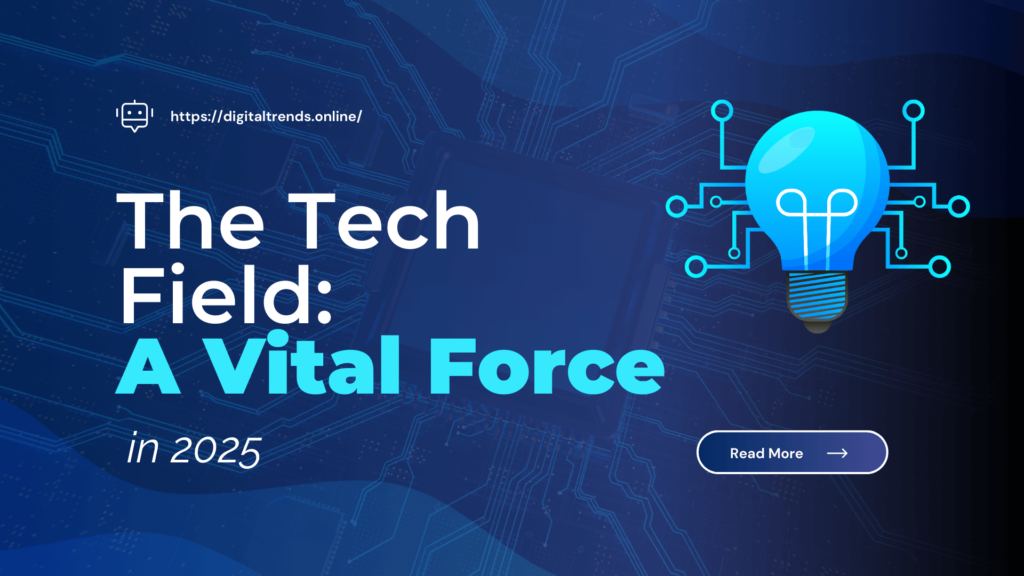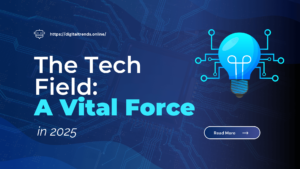
As we look towards 2025, the role of technology in our lives will be more critical than ever. Here’s why the tech field is not just important, but essential for a thriving future.
1. Economic Powerhouse
The tech sector continues to be a significant contributor to global economies. Startups and established companies alike are driving innovation, creating jobs, and boosting GDP. As more industries adopt technology, the economic landscape will shift, favoring those who embrace digital transformation.
2. Education Evolution
With the rise of online learning platforms and educational technology, by 2025, access to education will be more democratized. Personalized learning experiences powered by AI will cater to individual needs, helping students across the globe to succeed.
3. Health Innovations
Healthcare technology is transforming patient care. Wearable devices, telemedicine, and AI diagnostics are not just trends; they’re reshaping how we approach health and wellness. By 2025, expect more accurate, personalized, and accessible healthcare solutions.
4. Sustainable Solutions
Technology plays a pivotal role in addressing climate change. Innovations in renewable energy, smart grids, and sustainable agriculture practices will be crucial in reducing our carbon footprint and promoting environmental stewardship.
5. Cybersecurity Imperative
As technology evolves, so do the threats. By 2025, robust cybersecurity measures will be essential. Organizations must prioritize data protection and develop strategies to combat increasingly sophisticated cyber threats.
6. Enhancing Connectivity
5G technology will revolutionize connectivity, making the Internet faster and more reliable. This will facilitate the growth of IoT (Internet of Things), where smart devices will communicate seamlessly, enhancing everyday life.
7. Workforce Transformation
Automation and AI are set to redefine the workforce. While some jobs may become obsolete, new roles will emerge, requiring skills in technology and data analysis. Continuous learning will become a necessity for career advancement.
8. Global Collaboration
Technology breaks down geographical barriers, allowing for unprecedented collaboration across the globe. By 2025, diverse teams will work together in real-time, leveraging different perspectives to drive innovation.
9. Ethical Considerations
As tech becomes more integrated into our lives, ethical considerations around data privacy, AI fairness, and algorithmic bias will take center stage. Companies will need to prioritize ethical practices to build trust with users.
10. Cultural Shifts
The tech field influences culture, from entertainment to social interactions. Virtual and augmented reality will offer immersive experiences, changing how we consume media and connect with others.
11. Accessibility Improvements
Technology will continue to improve accessibility for individuals with disabilities. By 2025, expect more inclusive designs and tools that empower everyone to participate fully in society.
12. Smart Cities
Urban areas will leverage technology to become smarter and more efficient. From traffic management to energy use, smart city initiatives will enhance quality of life and sustainability in urban environments.
13. Data-Driven Decisions
Big data analytics will become integral in decision-making processes. Organizations will rely on data to drive strategy, understand customer behavior, and improve operations, leading to more informed choices.
14. Creative Industries
The tech field is transforming creative industries as well. Tools powered by AI can assist in music production, graphic design, and content creation, enabling artists to push boundaries and explore new mediums.
15. Blockchain Applications
Beyond cryptocurrency, blockchain technology will find applications in supply chain management, voting systems, and digital identity verification, enhancing transparency and trust in various sectors.
16. Human-AI Collaboration
Rather than replacing humans, AI will enhance our capabilities. By 2025, expect collaborative tools where humans and AI work together, leveraging each other’s strengths for better outcomes.
17. Mental Health Support
Technology will play a vital role in mental health care. From apps providing resources to virtual therapy sessions, tech solutions will help individuals access support when they need it.
18. Ethical AI Development
As AI becomes more prevalent, ethical considerations in its development will be critical. By 2025, guidelines and regulations around AI use will help ensure that technology is used responsibly and justly.
19. Renewable Energy Advancements
Technological innovations will drive advancements in renewable energy, making it more efficient and accessible. By 2025, we may see significant shifts towards sustainable energy sources, reducing reliance on fossil fuels.
20. Personal Finance Management
Fintech solutions will continue to evolve, offering users better tools for managing their finances. By 2025, AI-driven apps will provide personalized advice, helping individuals make smarter financial decisions.
21. E-commerce Growth
The shift towards online shopping will continue, with advanced algorithms enhancing the shopping experience. By 2025, expect hyper-personalized recommendations and seamless transactions, reshaping retail.
22. Remote Healthcare Monitoring
Telehealth will expand to include remote monitoring tools that track patients’ health metrics in real-time. This will facilitate proactive care, reducing hospital visits and enhancing patient outcomes.
23. Data Privacy Advocacy
As awareness around data privacy grows, advocacy for better regulations will increase. By 2025, consumers will demand greater control over their personal data, pushing companies to adopt transparent practices.
24. Digital Transformation in Government
Governments will leverage technology to improve services, making processes more efficient and accessible. Digital platforms will enhance citizen engagement, promoting transparency and accountability.
25. AI in Creative Arts
AI will become a collaborator in creative processes, helping artists brainstorm, create, and refine their work. By 2025, we may see a new genre of art that blends human creativity with machine learning.
26. Smart Manufacturing
The manufacturing sector will embrace automation and smart technologies to increase efficiency. By 2025, factories will be equipped with IoT devices that monitor production processes in real-time.
27. The Rise of EdTech
Educational technology will continue to expand, with new tools making learning more engaging. By 2025, gamified learning experiences and interactive content will redefine traditional education.
28. Changing Consumer Behavior
Technology influences consumer habits, driving demand for instant gratification and convenience. By 2025, businesses must adapt to these changes to stay relevant in a fast-paced market.
29. Supply Chain Transparency
Blockchain and IoT will enhance supply chain transparency, allowing consumers to track products from origin to delivery. By 2025, ethical sourcing will be a priority for many brands.
30. Remote Work Innovations
As remote work becomes standard, companies will innovate to maintain team cohesion and productivity. Expect new tools designed to foster collaboration and employee engagement.
31. Smart Agriculture
Agricultural technology will increase crop yields and reduce waste. By 2025, precision farming techniques will enable farmers to make data-driven decisions for sustainable practices.
32. Cross-Industry Collaboration
Tech companies will collaborate with traditional industries to drive innovation. By 2025, partnerships across sectors will lead to groundbreaking solutions that address complex challenges.
33. Enhanced User Experiences
Companies will prioritize user experience, leveraging data to create intuitive, personalized interfaces. By 2025, seamless interactions will be a hallmark of successful products and services.
34. Social Media Evolution
Social media platforms will continue to evolve, focusing on user safety and mental health. By 2025, expect new features that promote positive interactions and community building.
